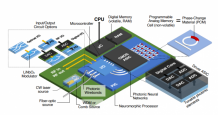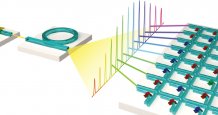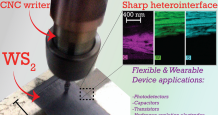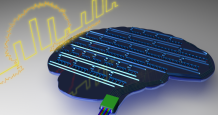NEST Group News archive: 2018-2021

Breaking Moore’s Law: New photonic computing project aims to speed up artificial intelligence computing power to petascale processing levels
The EU’s new 5.8 million Euro project using light to provide the ultrafast computing rates needed by artificial intelligence (AI) kicked off on 31 March.

New study investigates photonics for artificial intelligence and neuromorphic computing
Scientists have given a fascinating new insight into the next steps to develop fast, energy-efficient, future computing systems that use light instead of electrons to process and store information.

Speeding up machine learning by means of light
Scientists have developed a pioneering new approach that will rapidly speed up machine learning – using light.

Exeter experts organise global Artificial Intelligence summit to tackle pandemics
A global summit which aims to boost effective collaboration between experts working in Artificial Intelligence (AI) is being organised by academics at the University of Exeter.

Researchers pioneer new production method for heterostructure devices
Researchers at the University of Exeter have developed a pioneering production method for heterostructure devices, based on 2D materials such as graphene.

First-of-a-kind electro-optical device provides solution to faster and more energy efficient computing memories and processors
The first-ever integrated nanoscale device programmable with either photons or electrons has been developed by scientists in Prof Harish Bhaskaran’s research group at the University of Oxford - in collaboration with researchers at the universities of Münster and Exeter.

Making the railways safer and more reliable with Ze-Power
Professor Meiling Zhu, chair of mechanical engineering and head of the Energy Harvesting Research Group (EHRG) at the University of Exeter, introduces us to Ze-Power (Zero Power, Large Area Rail Track Monitoring): an innovative Engineering and Physical Sciences Research Council (EPSRC) funded project aiming to make the railway tracks safer and more reliable.

Researchers take a step towards light-based brain-like computing chip
Scientists have unveiled a new integrated photonic hardware that can store and process information in ways similar to that of the human brain.

Graphene biosensor could provide early lung cancer diagnosis, research shows
The wonder-material graphene could hold the key to unlocking the next generation of advanced, early stage lung cancer diagnosis.

Innovative new technique could pave the way for new generation of flexible electronic components
Researchers at the University of Exeter have developed an innovative technique that could help create the next generation of everyday flexible electronics.

Graphene unlocks new potential for ‘smart textiles’
The quest to create affordable, durable and mass-produced ‘smart textiles’ has been given fresh impetus through the use of the wonder material Graphene.

Scientists create innovative new ‘green’ concrete using graphene
A new greener, stronger and more durable concrete that is made using the wonder-material graphene could revolutionise the construction industry.
